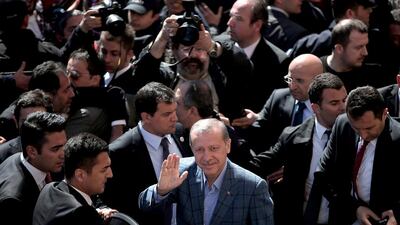Local elections in Turkey might be over, but political campaigning is just beginning.
The ruling Justice and Development Party (AKP) won about 46 per cent of the vote on Sunday, according to CNNTurk, up from about 39 per cent in 2009.
Yet a presidential election in August and parliamentary polls next year will keep politicians in campaign mode and Turkey’s population on edge.
Much remains undecided, especially the future of the prime minister, Recep Tayyip Erdogan.
Internal AKP rules prevent Mr Erdogan from seeking a fourth term as prime minister. At 60, Mr Erdogan is still a relatively young leader who appears to believe his vision for Turkey is unfulfilled.
He is likely to interpret the results of Sunday’s elections as a tacit approval of his rule and a signal to run for president in August.
The presidency in Turkey holds less power than the prime minister, but Mr Erdogan’s popularity with the masses and loyalists within the AKP will likely allow him to set the political agenda.
Large segments of the population would not appreciate the continuity.
In the past few years, Mr Erdogan developed an increasingly authoritarian outlook. Constraining his definition of democracy to success at the ballot box, Mr Erdogan turned his back on citizens who disagreed with him and angered regional countries with poorly conceived policies aimed at increasing his influence abroad.
Optimists might hope that success in Sunday’s polls would push Mr Erdogan to reset his policies. But, with two more elections looming, this is unlikely.
Already, members of the opposition fear that Mr Erdogan will use the months before the presidential vote to unleash a new crackdown on dissent.
His first target is likely to be followers of Turkish preacher Fethullah Gulen, who he accuses of instigating a corruption probe against his government and family.
He countered the investigations by firing or reassigning thousands of police officers and seeking increased control over the judiciary.
The release of audio recordings involving Turkish officials discussing military intervention in Syria only days before Sunday’s vote, an apparent attempt to discredit the AKP, increased tensions further.
This means that the coming months will likely see Mr Erdogan lead a crackdown on opposition that focuses on followers of Mr Gulen, known as the Gulen movement.
Once allies of Mr Erdogan, with many supporters within the state bureaucracy, the Gulen movement will likely find itself fighting an existential battle in the run-up to the next round of voting.
jvela@thenational.ae

